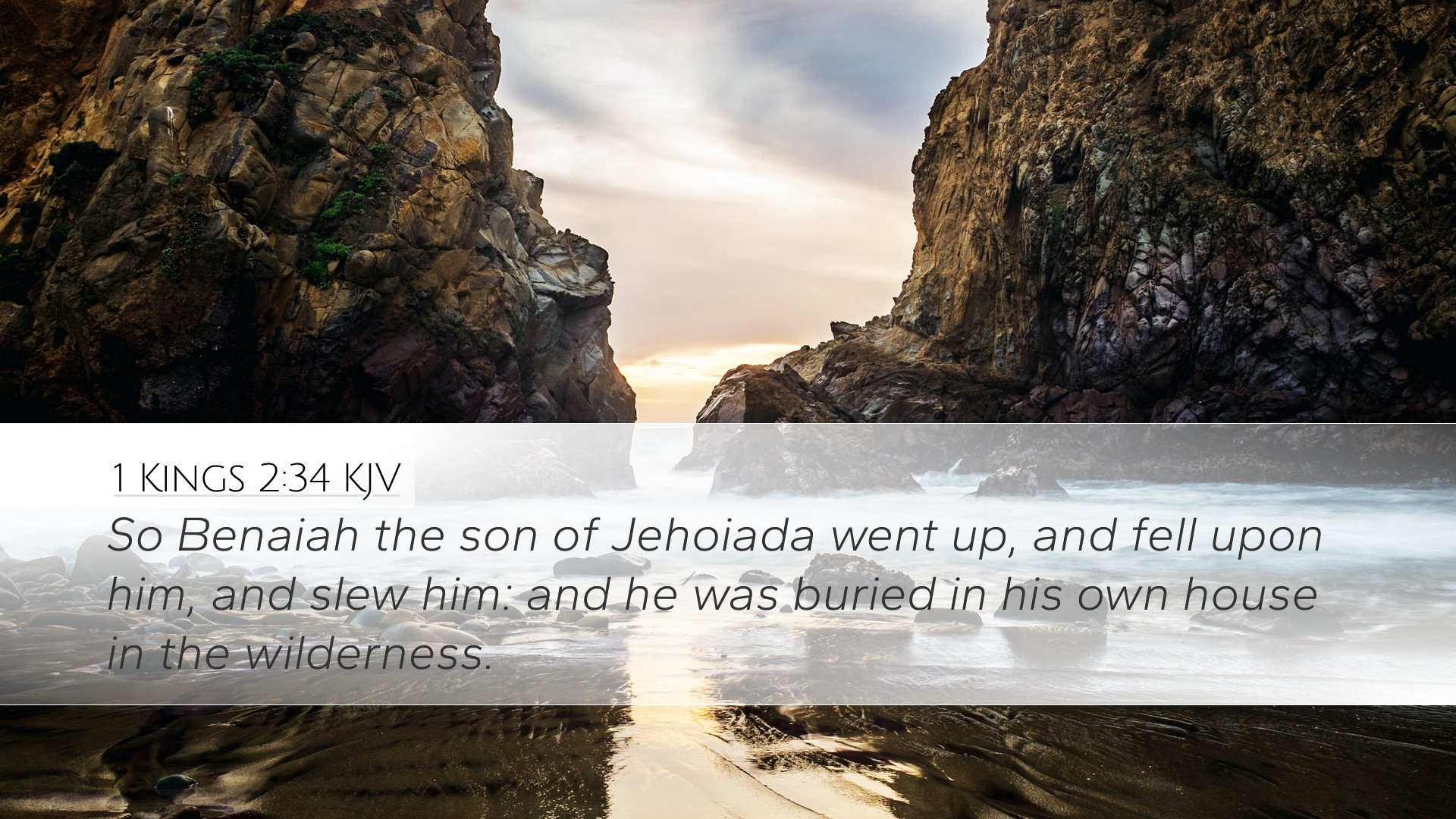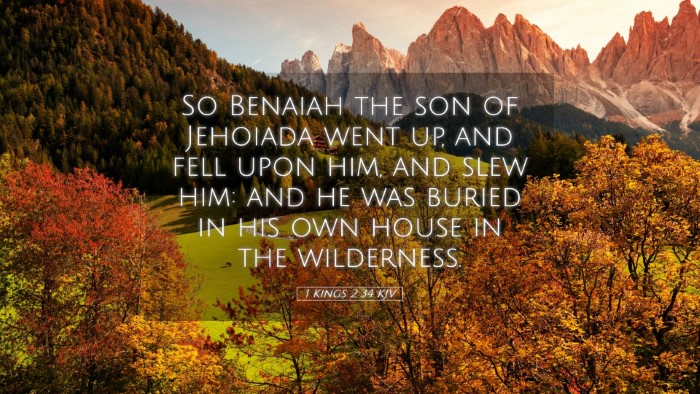Commentary on 1 Kings 2:34
Verse: “So Benaiah the son of Jehoiada went up, and fell upon him, and slew him: and he was buried in his own house in the wilderness.”
Contextual Overview
This verse occurs in the broader context of King Solomon's consolidation of power after the death of King David. It highlights key themes of judgment, justice, and the establishment of divine authority through the actions of human agents. The events following David’s reign illustrate the transition of power and the severity of consequences faced by those who oppose God's chosen leaders.
Commentary Insights
Matthew Henry's Commentary
Matthew Henry discusses the significance of Benaiah's actions as an instrument of divine justice. He emphasizes that Benaiah, a man of valor and loyalty, was carrying out Solomon’s orders, which were founded upon the need for a righteous and stable kingdom. Henry highlights:
- The Character of Joab: Joab had been instrumental in King David’s victories, yet his later actions were marred by treachery and rebellion, particularly in his support of Adonijah against Solomon.
- Divine Retribution: The death of Joab exemplifies the law of sowing and reaping, where the consequences of one's actions return upon them. His violent deeds resulted in his downfall.
- The Role of Benaiah: Benaiah’s bravery, as noted in the previous chapters, indicates that he was not only a loyal servant but also a figure fulfilling God’s purposes on earth by executing justice.
Albert Barnes' Notes
Albert Barnes provides insight into the political dynamics at play. He identifies several key aspects:
- Joab’s Death as Political Necessity: Solomon, needing to secure his reign, had to remove potential threats, and Joab embodied the last remnants of opposition from David’s cabinet.
- Burial in the Wilderness: The burial of Joab reflects his status at the end of his life—once a revered warrior, now reduced to ignominy and shame.
- Symbolism of Justice: Benaiah's execution of Joab serves as a representation of God's justice, demonstrating that criminal acts will have consequences, especially when they come from those who hold power.
Adam Clarke's Commentary
Adam Clarke takes a theological perspective, analyzing the spiritual implications of the verse. Key insights include:
- The Sovereignty of God: Clarke notes the sovereignty of God in enabling Solomon to carry out his judicial duties without hindrance, reinforcing the idea that God's plans will prevail irrespective of human actions.
- Moral Teachings: He underscores the moral lesson that leaders are accountable for their decisions and actions, which resonate with the biblical teaching of righteousness.
- Historical Reflection: Clarke also suggests that the historical documentation serves both as a caution and a lesson for future generations about the strength of divine justice.
Theological Implications
The verse and its commentary reveal profound theological implications regarding justice, leadership, and divine sovereignty. To theologians and scholars, 1 Kings 2:34 serves as a reminder that God’s authority is often executed through human agents. It highlights the seriousness with which God views sin and rebellion against His appointed leaders. The themes of accountability and the reaping of one’s actions resonate throughout scripture and serve as a potent reminder of the moral responsibilities entrusted to those in power.
Practical Applications
For pastors and students of the Bible, the lessons drawn from this text can be applied in various ways:
- Leadership Accountability: Recognize the need for transparency and accountability in leadership positions within the church and community.
- Justice and Mercy: Understand the balance of justice and mercy, where leaders must act decisively against wrongdoing while also exemplifying grace.
- Divine Will in Human Actions: Acknowledge and discuss how God’s divine will can be manifest through the decisions and actions of individuals, prompting reflection on the ways in which believers can be instruments of peace and righteousness.
- Reflections on Character: Encourage self-examination regarding personal character and the pursuit of integrity, reflecting on the consequences of unfaithfulness in positions of trust.
Conclusion
1 Kings 2:34 encapsulates a pivotal moment in the biblical narrative, merging the themes of divine justice, human agency, and the serious consequences of one's actions. The commentaries from Henry, Barnes, and Clarke provide rich, layered insights that are essential for deep theological reflection and practical application for today’s believers. As the church navigates the complexities of leadership and moral accountability, this verse remains a beacon of the principles that guide just governance under divine authority.


